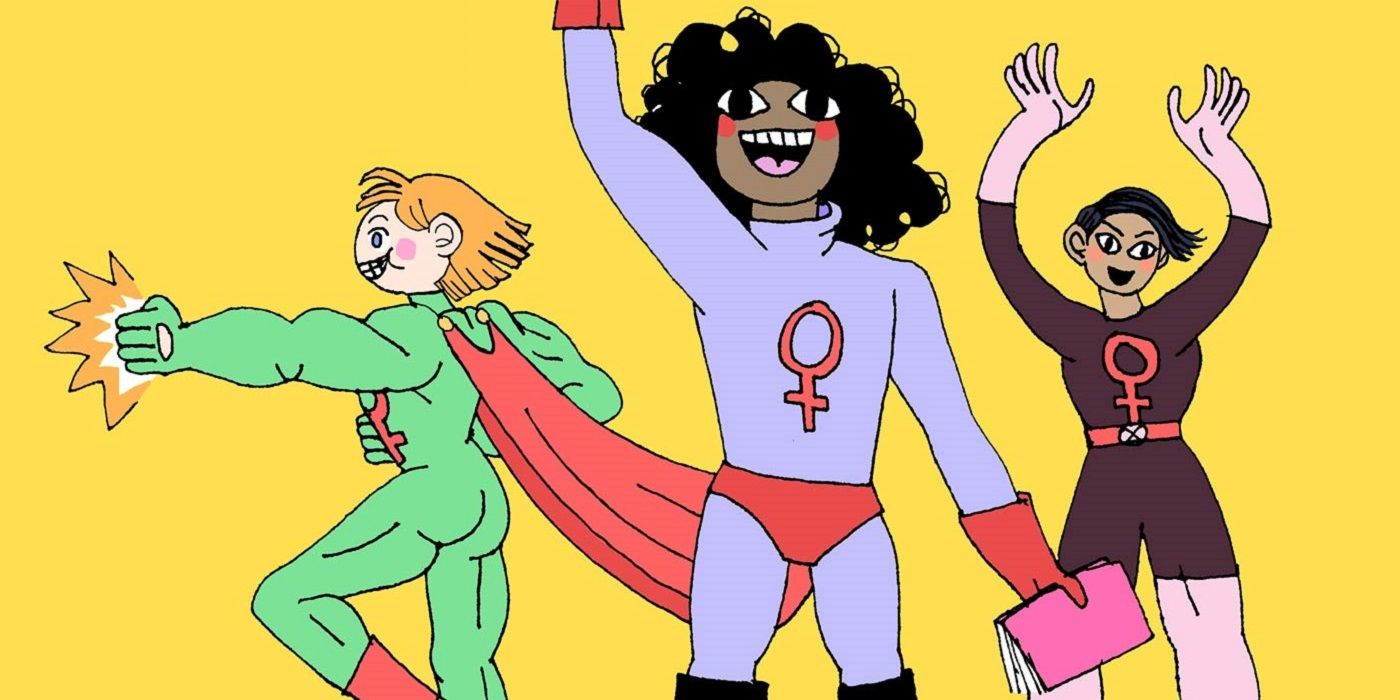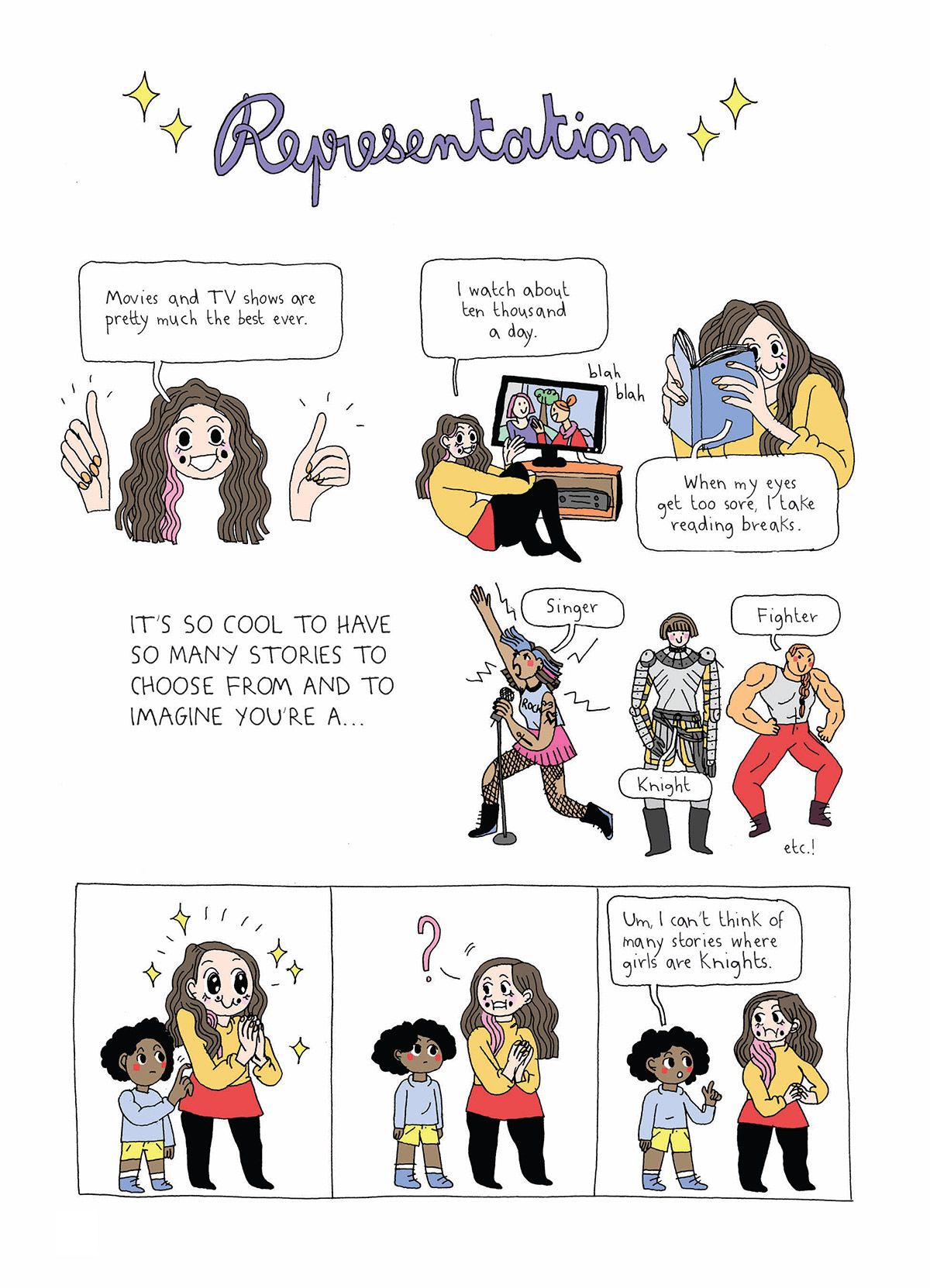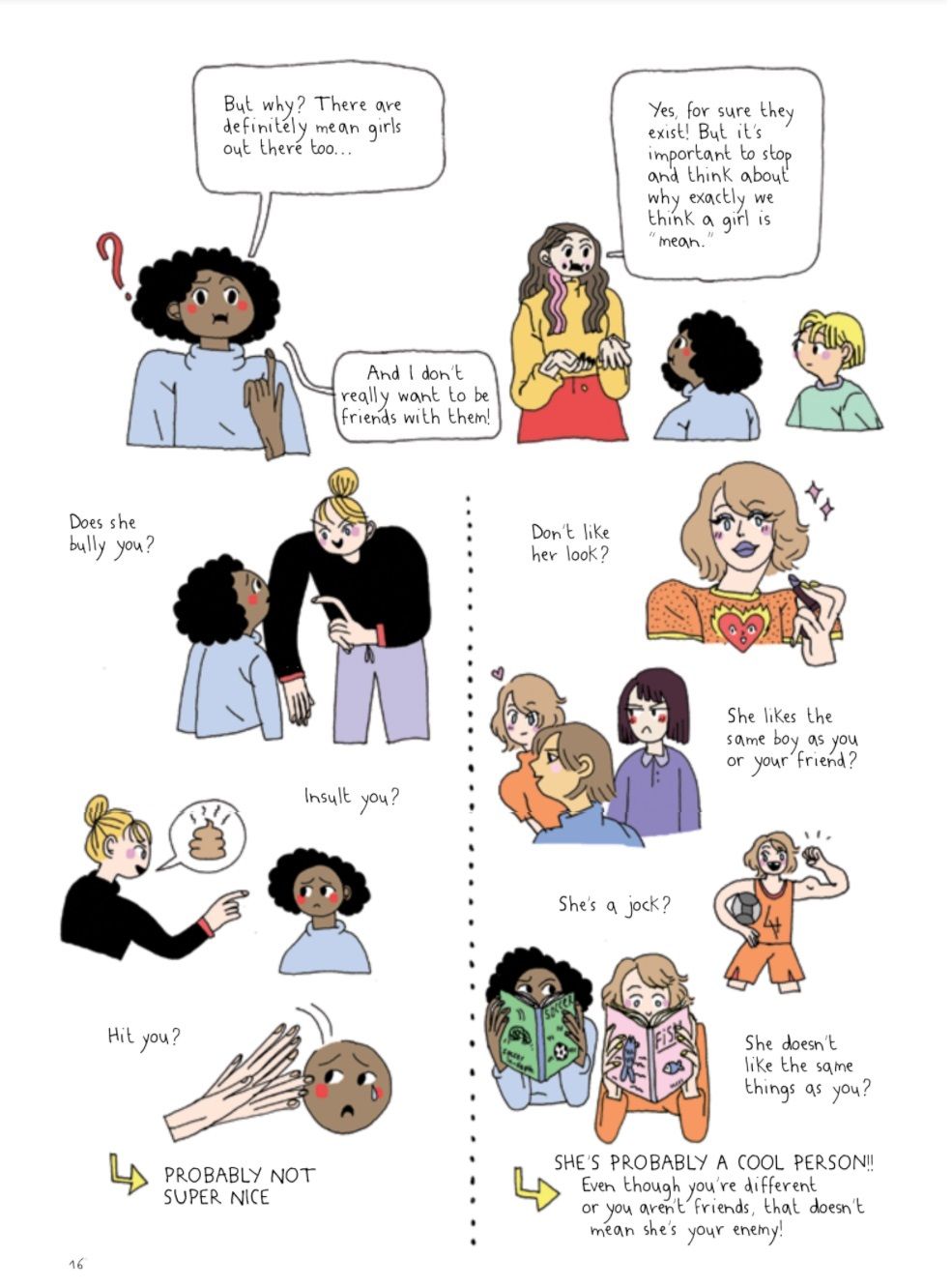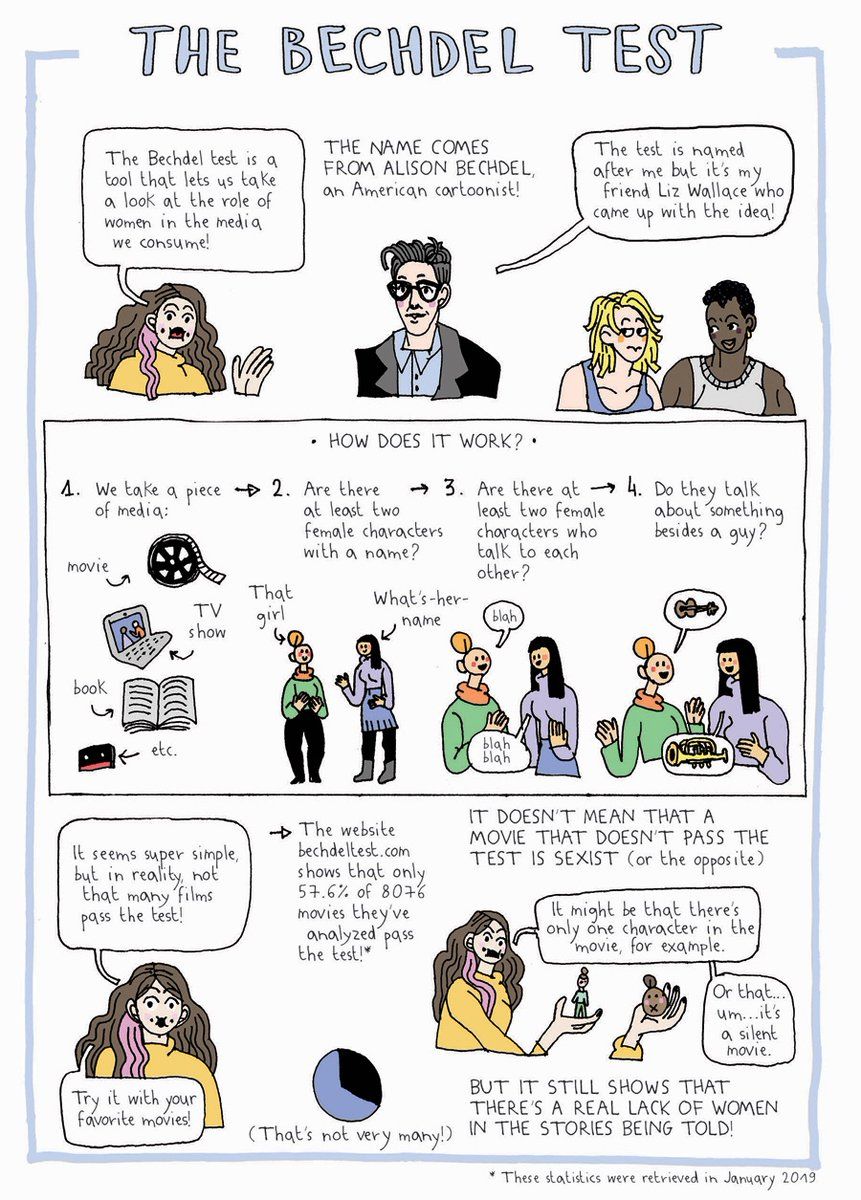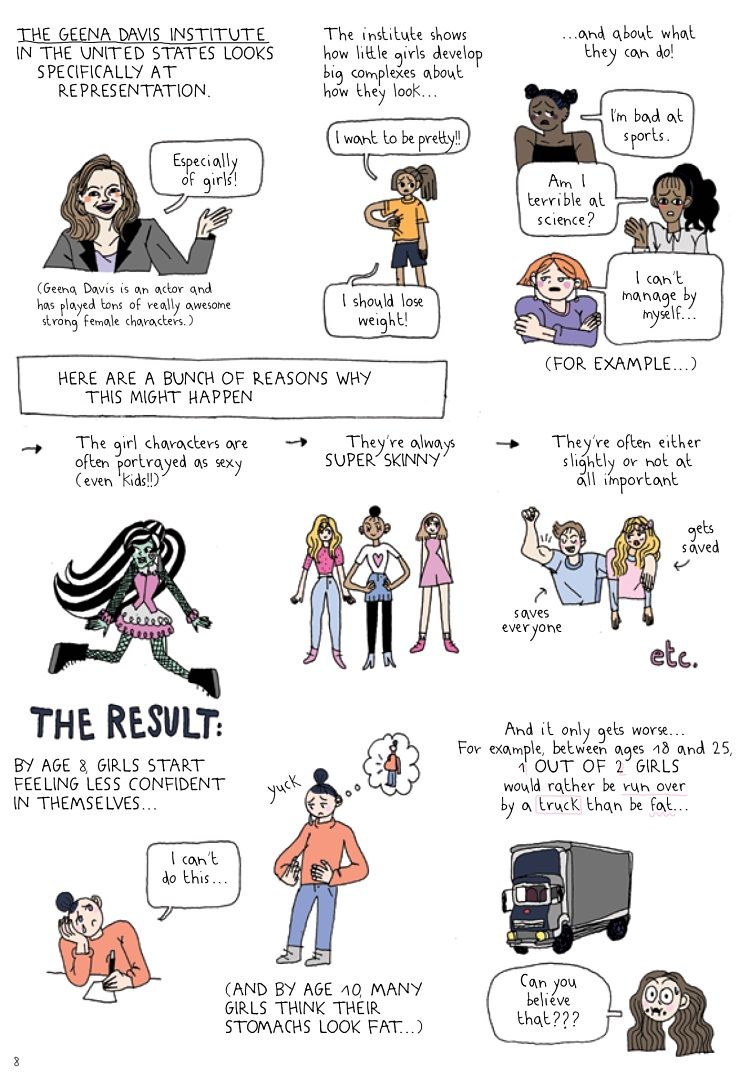In "Reason to Get Excited," I spotlight things from modern comics that I think are worth getting excited about. I mean stuff more specific than "this comic is good," ya know? More like a specific bit from a writer or artist that impressed me.
Today, I am doing a special edition of Reason to Be Excited by discussing The League of Super-Feminists by Mirion Malle (from Drawn & Quarterly) with Amelia, the 10-uear-old daughter of my friend, Kristen. Kristen's an awesome film professor (check out her film history book, Comic Venus: Women and Comedy in American Silent Film, here), so I figured Amelia would be a great audience for Malle's work. Here is our discussion (Kristen wrote Amelia's responses, and occasionally added some of her own thoughts).
Brian: Thanks for sharing your thoughts on the book, Amelia!
Brian: My first question would be, how much of this stuff were concepts that you were already familiar with?
Amelia: Quite a bit, actually. I knew most of the concepts but this was just deeper.
Brian: Was it ever a case of where you had the basic idea behind it, but the book sort of put a name on it?
Amelia: Yeah, I did for some of the concepts.
Brian: Now, your mom is obviously an expert on this sort of stuff, so do you think that you were coming from a more advanced take on these ideas, or do you think you friends have a similar understanding of these things?
Amelia: I would say maybe. Honestly I don't know.
Brian: The book was translated from French, did you notice any areas where the translation seemed a bit off, or did you think it got the points across clearly?
Amelia: I don't remember pointing out anything, but I would point it out if there was something.
Kristen: It's been a couple of weeks since we read it, so neither of us really remembers specific language...
Brian: No worries!
Brian: Now useful was the specific comic book aspect of the story? Do you think it helped get the ideas across better than if this was just a text work?
Amelia: I think it would work as just text, the ideas would still come across. But there were times when they would show stereotyping, or things that people do, or ways that people look, and it was helpful to see the pictures. So, yes, it was very helpful to have the pictures.
Kristen: BTW, we were both big fans of the image on p. 16 to illustrate someone insulting someone else!
Brian: Can you recall any parts of the book that brought up an idea that you never considered, but once it was pointed out in the book, it kind of irked you?
Amelia: I don't really remember but probably.
Kristen: She did a LOT of ranting while we were reading it! I don't know if the concepts were new, but it generated a lot of discussion between us and she had some STRONG opinions!
Brian: Had you heard of the Bechdel Test before this book?
Amelia: No, I hadn't. It's a good idea though.
Brian: Do you think the examples that the book gives of its ideas good for sharing with others, or was it better for just picking it up yourself. In other words, if, say, stereotypes came up in a conversation with someone, could you see yourself using the arguments in the book?
Amelia: Probably. To be honest I probably wouldn't remember the arguments. But I probably would use them if I could remember them.
Brian: So were they more just interesting concepts that you read in the moment and discussed with your mom, as opposed to something that stuck with you?
Brian: Something that is a conversation starter is a worthy goal in of itself, of course
Brian: I don't mean it as dismissive of that if that was the case.
Amelia: They didn't really stick with me because I knew most of the concepts, but for someone who didn't know the concepts it would probably stick with them.
Brian: Your mom and I were joking about how some of the ideas are too complicated for adults to grasp. Were any of them just TOO complicated?
Amelia: For younger kids it would probably be too much, but for kids around my age or older it would make sense.
Brian: One of the most complicated ideas in the book is intersectionality. Do you think that the invisible backpack idea got that idea across well enough?
Amelia: I'm not gonna lie, that was one of the concepts that I remembered. That made a lot of sense to me, and so yeah, I think that did get the concept across.
Brian: That's great to hear, as that's specifically the area where your mom and I were talking about how even 40 year olds still seem to have a problem understanding it.
Brian: What did you think of Marion Malle's art overall? How did it compare to some of the other graphic novel artists you've been reading?
Amelia: I do know a lot about different art styles, and this art style was actually pretty good. A lot of points I liked how sometimes it was only the head and the hands, it reminded me of VR, I thought that was funny. Overall it was a good art style. Some of the parts were disproportionate but that's to be expected, it's a graphic novel, but it's a good art style.
Brian: You mentioned that some of the stuff would be a bit outside the grasp of a younger audience. Do you think that, overall, the book would probably appeal more to a slightly older group, or do you think 10-11 year olds could still reasonably relate to the ideas in the book?
Brian: I guess it's a slightly reworded version of "Are you just TOO smart?"
Amelia: Maybe 9 and up. I'm sure a lot of people could grasp the concepts.
Brian: Do you think that the pop culture that you've been exposed to in the last couple of years have been making more of an effort to address this sort of thing? I just wonder whether this work lands better because the younger-focused content out there IS more aware of this sort of thing and thus it comes up enough for kids your age to be more familiar with it. Have you noticed any sort of change in the shows you watch over the last couple of years like that?
Amelia: I don't really know since you guys (mom & dad) always pick movies/tv shows that have female protagonists, so I don't really know, but I don't really notice this stuff in the movies that I watch.
Kristen: I actually notice this stuff in what she watches and the graphic novels she reads - for example Cardboard Kingdom or Lumberjanes, and shows like Kipo and the Age of Wonderbeasts [best show ever!] and Hilda. So I think you're right that kids' media in general has more a progressive feminist viewpoint and is more focused on intersectionality. But Amelia's right that I definitely weed out media that looks like it might be iffy.
Brian: That's interesting, Amelia, because I guess that goes back to my question (which you weren't sure of), which is how much your mom knowing all about this stuff affects your understanding.
Brian: And I think the answer is that, without even really necessarily knowing it, it really DOES make an impact having your mom and dad looking out for this stuff.
Brian: Like I know kids your age, for instance, whose parents would actively object to them reading Lumberjanes.
Brian: I know, as they told me when I tried to recommend it.
Kristen: I just asked her how she knew these concepts already, and she says she has no clue. But the kids she knows - and she moves in a pretty liberal circle - already know about feminism and are cool with gender fluidity and whatnot. Like, they'll correct each other if they refer to something as "he", and say "or she - don't assume gender!"
Brian: That's great.
Kristen: Amelia wants to know why they would object to Lumberjanes?
Brian: The Lumberjanes are a nice cross-section of girls, and some parents don't want their kids to learn about other kinds of kids.
Kristen: She just scrunched her face and said, why? What's the point? Those kids are going to grow up to be very antisocial!
Brian: Well, what if they only hang out with other kids whose parents taught them the same sort of thing?
Brian: But yes, it's not good.
Brian: They are definitely missing out.
Brian: Okay, I think we covered this book really well. Thanks to you both!
Brian: As an aside, what other comics have you been reading, Amelia?
Kristen: Right now she's into Babysitters Club, and she's read Katie the Catsitter about 1000 times
Brian: Colleen, the writer of Katie, told me
Brian: When I told her how much you liked it
Brian: That, "This made my day! We'll have to make sure Book 2 is totally worth the wait! I just finished writing Book 3 so there will be a whole lot more catsitting adventures on the way!"
Kristen: Amelia just made the happiest face
Kristen: I actually just used a panel from Katie in a PPT for an animation class I'm teaching. I needed an example from a comic to show the idea of gutter space in between frames, so I decided to use Katie to give them a little publicity.
Brian: Yay!
Brian: And Colleen has another cool book that you should read when you're a bit older, Amelia.
Brian: That was banned in Texas.
Brian: Thus making it all the more compelling.
Kristen: Any book that's banned in TX is worth checking out!
Kristen: What's the book?
Brian: It's called Kiss Number 8. It was longlisted on the National Book Award.
Brian: But Texas has problems with, you know, THEMES
Kristen: Oooh, it looks fantastic! I might get it and hang on to it until she's ready

